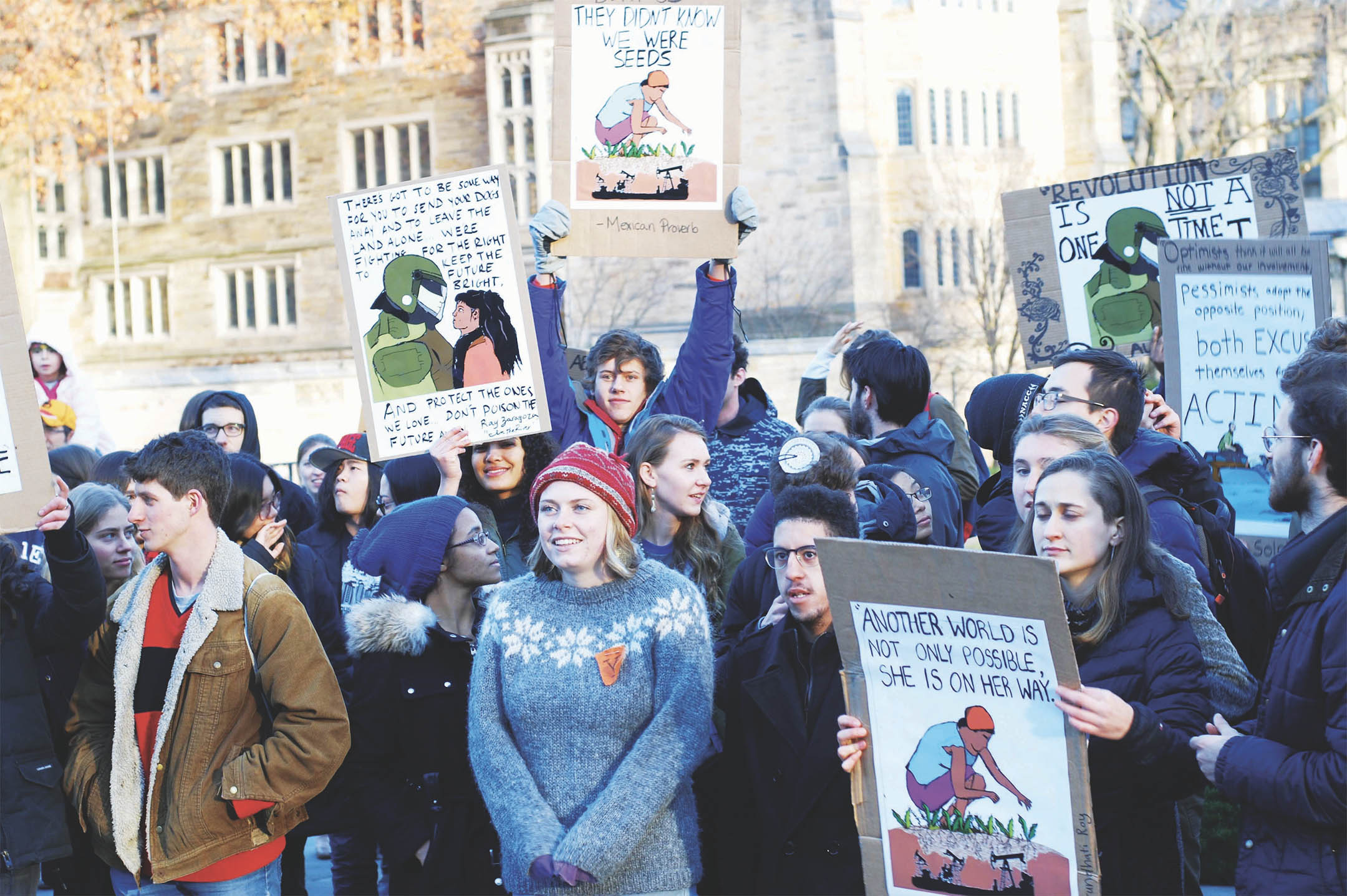
The Yale Advisory Committee on Investor Responsibility met with three senior executives at Exxon Mobil Corp. in March, a major step in the committee’s efforts to determine whether the University should divest from Exxon Mobil, the largest oil company in the world.
ACIR Chair Jonathan Macey LAW ’82 described the conversation with Exxon Mobil to members of Fossil Free Yale, Yale Students for Prison Divestment and the Dwight Hall Socially Responsible Investment Fund at a meeting in Luce Hall on Saturday. Catherine Hill GRD ’85, a University trustee who was on campus for the Yale Corporation’s meeting this weekend, was also in attendance.
The ACIR’s meeting with Exxon Mobil came in the wake of months of research focused on the company’s attempts to sow public doubt about climate change. In an interview with the News, Macey said he is hopeful that the ACIR will submit a recommendation to the trustees on whether to divest from Exxon Mobil in time for the next Corporation meeting in June. In April 2016, Yale’s external investment managers divested around $10 million of the endowment from three publicly traded fossil fuel producers.
Macey declined to say whether he expects the ACIR to recommend divestment at the June meeting. Still, according to Susan Wang ’18, the sole undergraduate representative on the eight-person committee, the ACIR was “leaning toward recommending divestment” in December, but decided to gather more evidence to bolster its case against Exxon Mobil.
“The issue was that we wanted to make sure that we were following ‘The Ethical Investor’ framework and engaging appropriately,” Wang said, referring to the 1972 manual that guides Yale’s investment decisions. “We figured we had not yet talked to Exxon directly about these issues, and figured a meeting with them was warranted.”
Yale holds an undisclosed number of shares in Exxon Mobil, whose history of climate change denial has drawn scrutiny from FFY. The ACIR, which serves as the conduit between the University community and the Yale Corporation on investment issues, began investigating Exxon Mobil last spring. During the Corporation’s meeting in February, the ACIR met with the Corporation Committee on Investor Responsibility, which oversees Yale’s investments, to discuss its latest research.
“The ACIR weren’t asking CCIR to make any decisions [in February] and were not making any recommendations to us,” said Hill, who serves on the CCIR, in an interview with the News. “They were just updating us on where their process and procedure stood, and at that point they had decided that they needed to meet with Exxon.”
The ACIR and the CCIR did not meet this weekend. But at the student meeting on Saturday, Macey said the ACIR’s recent work has focused on whether the American Legislative Exchange Council — an interest group heavily funded by Exxon Mobil that has challenged the scientific consensus on climate change — qualifies as a “climate change denial organization.” Under the rules outlined in “The Ethical Investor,” a book authored by Yale professors whose guidelines the Corporation adopted in 1972, Yale is obliged to divest from companies that commit “grave social injury.” Exxon Mobil might fit that description if the ACIR found that the company was using ALEC as a kind of front to perpetuate climate change denial.
“The issue has sort of crystallized onto what is the nature of ALEC,” Macey said at the meeting. “If ALEC fits that category, that would be grounds for the ACIR to make a recommendation to divest.”
According to Wang and Macey, the ACIR discussed ALEC at its meeting with the executives, who claimed Exxon Mobil does not support climate change denial.
“It was helpful to actually speak with executives and hear kind of their side or their defense on some of the issues regarding ALEC,” Wang said. “It was helpful to have a face-to-face conversation about it, rather than reading about their stance through their [public relations] channels.”
Chelsea Watson ’17, the communication director for FFY, said she is confident that the ACIR will eventually recommend that the Corporation divest from Exxon Mobil. But she expressed disappointment that the CCIR did not sit down with the ACIR during this weekend’s Corporation meeting.
“We were under the impression that the CCIR has been having these conversations, and it became evident that they have not yet discussed [Exxon divestment], which is frustrating given the amount of labor we’ve put into these proposals,” Watson said.
Despite the ongoing work of the ACIR, Nathan Lobel ’17, FFY’s policy coordinator, said he remains concerned that the CCIR will take an unnecessarily long time to decide whether to divest from Exxon Mobil.
“By June, it will have been 18 months since the ACIR initially said, ‘We think that this might be grounds for divestment,’” Lobel said. “Even if there’s a recommendation, who knows how long it will be before the Corporation votes on the recommendation. I’m always happy to hear about forward movement, but I continue to be disappointed by how inefficient this process is.”
Meanwhile, the ACIR is also looking into Yale’s investments in the private prison industry, but those discussions are still at a preliminary stage, Macey said at the meeting. The activist group Yale Students for Prison Divestment was founded in fall 2015, and is scheduled to meet with the ACIR on April 18.
FFY was founded in fall 2012.
Correction, April 12: A previous version of this article misstated the role of the CCIR. The committee oversees Yale’s investments but does not have final decision-making authority over them.







